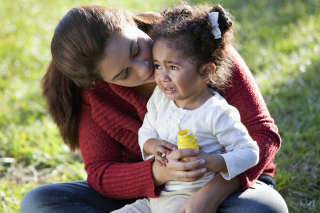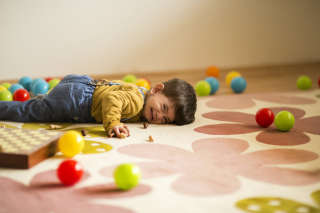Search Results
Age
Type
Topic
Parenting & Behavior Management Strategies (Preschooler)Kids ages three to five years old may have developed strong language skills and experienced many things, but they are still learning about how to manage their behavior and emotions. By being exposed to more environments (like daycare or preschool) and people (like teachers and new friends), your child is learning how to act and respond in different situations.
Parenting & Behavior Management Strategies (Baby)Parenting is a family’s approach to raising a child. Teaching your baby appropriate behaviors and responses is a big part of it. When deciding how to discipline your baby, it is important to research different strategies and choose the approach that works for your child and family. Don’t be afraid to mix the approach and match strategies as long as they work at helping your baby learn in a positive way, and you are consistent with what you do. Remember to model expectations.
Parenting & Behavior Management Strategies (Toddler)Parenting is a family’s approach to raising a child. Teaching your toddler appropriate behaviors and responses is a big part of it. When deciding how to discipline your baby, it’s important to research different strategies and choose the approach that works for your child and family. Don’t be afraid to mix and match strategies as long as they work at helping your toddler learn in a positive way, and you are consistent with what you do.
Different Discipline Styles in Action: Various Ways to Respond to MisbehaviorDiscipline is often most effective when it’s consistent and predictable for children. If the expectations continue to change, children might get confused about how to act in specific situations. It’s important for both caregivers to co-develop boundaries, expectations, and approaches to discipline and then apply those consistently.
Strategies to Help Caregivers Stay Calm in Difficult MomentsEvery day, you’re doing an amazing job providing for and loving your child. You make the meals they enjoy and read the stories that spark their imagination. But there will always be difficult moments, tears, and outbursts. Staying calm in these stressful moments can help build your bond with your child and keep your relationship strong.
Why Is Bedtime Always a Battle With My Toddler and What Can I Do About It?Do you dread bedtime every night? Do you anticipate negotiations, tears, and difficult behavior from your toddler when it’s time to go to sleep? If so, you’re not alone. Due to their development stage and other factors, toddlers can make bedtime a bad time. We’ve provided some strategies you can test out and see if they help ease your toddler to sleep.
How to Help Your Toddler Manage Big EmotionsBeing the caregiver for a toddler comes with so many sweet moments, belly laughs and a lot of big feelings. Toddlers are still learning how to feel and deal with their emotions. Try out these simple strategies to teach them ways to cope with their feelings.
3 Ways to Help Your Child Bounce Back From Difficult MomentsAs caregivers, we have the incredibly important job of giving our children the tools and support that will help them thrive throughout their lives. Helping them become resilient, or able to bounce back from difficult moments, will provide lasting benefits to our children.
Toddler Aggression: Strategies for Discouraging Hitting and Biting Toddlers have a lot of big emotions, but they often don’t know how to express them. Sometimes they turn to aggressive behaviors like biting or hitting when they’re not able to talk about their feelings or needs. As caregivers, we can teach them safer ways to communicate about and handle emotional moments.
My Children Won’t Stop Fighting With Each Other—What Can I Do?Raising siblings can be a roller-coaster ride. One moment, they might be playing peacefully, sharing toys and giggles. And then the next moment, a fight breaks out. Sibling conflicts and disagreements are common, but they can be challenging to manage and resolve. We’ve provided some techniques that caregivers can try to help reduce sibling conflicts and promote a peaceful home environment—while teaching valuable skills that will benefit them throughout their lives.
- «
- ‹
- 1
- ›
- »
17 Results found

















